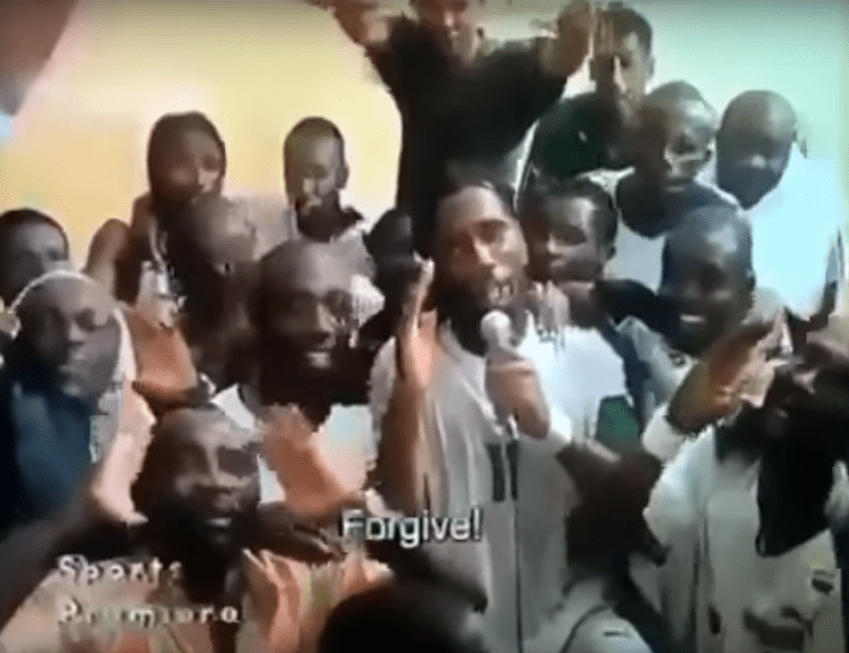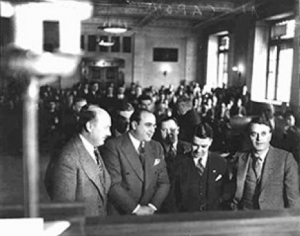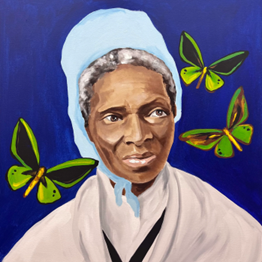The King of Sports, Football (American soccer). Every four years, the world watches the FIFA World Cup. Every four years, people from all parts of the world stop everything they’re doing in order to watch their country play football. Every four years, billions of dollars are invested in this event.1 Many praise it, many criticize it, but what nobody can deny is that football has a power to unite an entire nation and give its people hope and joy, whatever their condition or situation might be. Did you think football was irrelevant and useless? Well, you would be wrong. The power of football is immense, and the story you are about to read will show it. Yes, football, eleven players looking to put a ball in a goal, was able to end a civil war!

Despite moving to France at the age of five, Drogba never forgot his roots nor his people.5 Despite having the possibility of changing his nationality to French citizenship, which would have allowed him to play with a much more competitive team and with greater aspirations to win a World Cup (the ultimate prize of every football lover), love of his homeland was of greater importance to him. When Drogba returned to Côte d’Ivoire, he not only found a football team in ruins and with little hope of achieving any important achievement, but he also found a country in ruins and with hopes of progress almost destroyed.
It all began in September 2002. A group of military opponents of the Ivorian government decided to take the main cities of the country as a symbol of rebellion. The rebels attempted a coup, but it did not work, so they took refuge in the north. That was the beginning of the civil war in Ivory Coast.6

Despite the thousands of deaths during the first three years of the civil war, there was a reason to celebrate in Côte d’Ivoire: football. In 2005, Côte d’Ivoire obtained its first classification to a FIFA World Cup in all its country’s history. It came in a game against Sudan, in which the Ivoirians won 3-1.7 And then, with everyone celebrating that epic result, the captain of the Ivory Coast team, Didier Drogba, wanted to turn that celebration into a momentous moment for the history of the country. Kneeling, and surrounded by all the different races that made up the Ivory Coast Football Team, he turned to the national television camera, and began his message:
“Men and woman of Cote d’Ivoire from the North, South, Centre, and West. We proved today that all Ivoirians can co-exist and play together with a shared aim: to qualify for the World Cup. We promised you that the celebration would unite the people. Today, we beg you, on our knees: Forgive! Forgive! Forgive! The one country in Africa with so many riches must not descend into war. Please lay down your weapons. Hold elections. All will be better. We want to have fun, so stop firing your guns!” 8
Drogba’s message touched Ivoirians, because the country was affectionate at that moment of great celebration, and because they needed someone to open their eyes. After more than four-thousand dead in three years, who better to do so than the greatest idol who, at that time, was already elevated to the level of eternal legend. A week after that gesture, the two sides agreed to a cease-fire; it was the beginning of the end of the war.9

Although “Didi”’s speech was well received by both sides of the confrontation, there were still things to resolve in order to say that “the civil war was over.” Thus, in 2006, when Drogba received the prize for best African footballer of the year, he decided to return to Ivory Coast to show his country the precious trophy. But he did not go to his birth city, the capital of the country: he traveled to Bouaké, one of the cities that had been occupied by the rebels opposed to the government, where they had installed their headquarters. When he arrived, Drogba also gave a speech that again spoke of the importance of unity and peace for the progress and development of the West African country.
After that episode, in 2007, the captain of “The Elephants” (nickname given to the Ivorian soccer team) proposed something that was really daring and dangerous in case it materialized. Drogba’s aim was to realize an official match of the national team in the same city, Bouaké. His goal was to bring the unity of the country to its maximum expression on the most conflicted place, the capital of the rebels. It was not easy, but with the mediation of Drogba, the political and football authorities agreed. It was clear that it was not going to be a normal football game. That date, June 3rd of 2007, was The Day for Ivoirians. There was strong tension in the air, because both the people of Bouaké and those of the capital were present in the stadium. The pressure increased a lot more when the leaders of the Ivorian government arrived, who were with the rebels for the first time without bullets separating them. Miraculously, the king of the sport was able to bring rebel leaders, government leaders, and soccer fans together in one place. Then, the national anthem started, and the Ivoirian president Laurent Gbagbo and the rebel leader, Guillaume Soro, sang it side by side. Drogba knew at that moment that the Civil War was over. “To see the two sides together, to sing in unison the hymn of my country was very special. I felt Côte d’Ivoire was born again,” declared the great striker. Not surprisingly, the following day, after Ivory Coast’s 5-0 win against Madagascar, a local newspaper called “Five goals to erase five years of war.”10
Drogba ended up winning all the hearts of the Ivorian people, when in 2009 he decided to donate a hospital in Abidjan, the capital of his country. He did it with the three million pounds he had received after carrying out an advertising campaign with a well-known brand of soft drinks. He just established one condition: that the hospital services were totally free.11
In 2010, the well-known TIME magazine included Drogba among the 100 most influential people in the world, because of his peace objectives and results in the Ivorian Civil War.12From there, he became a United Nations Goodwill Ambassador. In addition, Drogba has a foundation, which built five hospitals in Côte d’Ivoire. The hospitals in Abidjan, Yamoussoukro, Man, Korhogo, and San Pedro, which cost five million dollars, were paid for with Drogba’s own money.13 In football, you can be an idol based on goals and titles. But Drogba is much more than an idol. He is a hero, almost a saint, in Ivory Coast.

Like him, there are thousands of artists and athletes who enjoy popularity and unanimous approval in their countries. The great majority of these artists are blinded by fame and lust. They squander all their money and end up consuming drugs or are stuck in scandals of sexual abuse, tax evasion, or alcoholism.14 This was not the case for Didier Drogba. The Ivoirian used all his influence to build a better future for the next generations of Ivoirians. A World Cup qualification is an invaluable gift for a football lover, but something that even surpasses this is what “Didi” did: give his compatriots peace. Let us hope that the case of Drogba will not be the only one, and that these influential people can use their popularity for the good of others, for peace.
- Veysel Avsar and Unal Umut, “Trading Effects of the FIFA World Cup,” Business Source Complete, no. 3 (May 2014): 315-329. ↵
- Encyclopædia Britannica, September 2014, s.v. “Drogba, Didier,” by Jack Rollin. ↵
- Ishaan Tharoor, “These global sporting events totally dwarf the Super Bowl,” The Washington Post, February 05, 2016. ↵
- Grant Wahl, “In Praise of Drogba,” Sports Illustrated 116, no. 22, (May 28, 2012): 53. ↵
- Encyclopædia Britannica, September 2014, s.v. “Drogba, Didier,” by Jack Rollin. ↵
- Abu Bakarr, “Democracy and Civil War: Citizenship and Peacemaking in Cote d’Ivoire,” African Affairs no.1 (February 2010): 513. ↵
- Peter Law, “The World at their feet: five African representatives will be among 32 finalists vying for honors,” New African, no. 452 (June 2006): 59. ↵
- Paddy Agnew, “Drogba calls for peace as football unites Ivory Coast,” Irish Times (February 07, 2006): 12. ↵
- Grant Wahl, “Soccer Savior,” Sports Illustrated 112, no. 22 (May 2010): 52. ↵
- Alex Hayes, “How Drogba united the Ivory Coast Chelsea star acclaimed by his countrymen after ending five-year civil war,” Daily Telegraph (August 8, 2007): 22-23. ↵
- Laura Williamson, “It’s Saint Drogba!,” Daily Mail (November 12, 2009): 96. ↵
- Richard Stengel, “The 2010 TIME 100,” Time Magazine (April 2010). ↵
- John Hutchinson, “The Didier Drogba Foundation,” The Sun (February 17, 2012): 24. ↵
- Lawrence Wenner, Fallen sports heroes, media, and celebrity culture (New York: P. Lang, 2013): 201. ↵



71 comments
Maxx Arizmendi
I never heard of Dragba, nor did I ever know about the civil war that occurred in his country. Reading this article made me learn something new about this point in African history, because I learned that the FIFA game against the Ivory Coast actually ended their civil war, and it was interesting to learn about that. I thought this article was a great read.
Tyanne Pearcy
This article immediately caught my attention because I’ve grown up watching Drogba play soccer. He was an outstanding player for Chelsea FC and always showed up during the FIFA World Cup. I have never heard of this story and it is very touching and inspiring. The love that he has for his country to be able to stop a terrible war that had gone on for too long is truly courageous. This certainly makes me not just a soccer fan of his but of who he is and represents.
Luis Magana
Since I am Mexican soccer is a big part of my culture and I have always loved to watch or play soccer. I actually saw Drogba play soccer and I can truly say he is a smart and phenomenal striker. But I always had the impression that soccer players are usually stuck up with the exception of a few players. After reading this article I learned how humble and selfless he is for thinking of his home and giving back. If more people knew about his actions I would imagine he would be an inspiration but no one really knows him either than a professional soccer player.
Angel Torres
I’ve known about Drogba since when I began watching soccer as a little kid. I knew all about the great soccer player he was a Chelsea FC and with the Ivory Coast National Soccer team, however I knew nothing about his philanthropy nor the efforts he put in to uniting Ivory Coast. Its nice to see how soccer players can use a sport as more than a means to make a living. Drogba used his passion for the sport as a tool to unite, give back, and bring peace to his country.
Ariana Melendez
It is fascinating to read a story about a person who was never shallow and always remembered their roots, as we do not see most of that today in famous people. This footballer is truly an inspiration. As a soccer fan, I can agree that the sport has the ability to unite an entire country, as well as cause turmoil in between countries. Nonetheless, this article does a great job at exhibiting the power of soccer through the actions of one player, Drogba.
Taylor Rech
The thing that every soccer fan knows is that “the beautiful game” brings people together, so being a soccer fan, reading this article really hit home. It is wonderful to read about good things happening in this world that is full of negativity and violence, and to have it initiated by a soccer player makes it even better. I found the details in this article incredibly interesting and find it remarkable that one man brought an entire nation together to end the violence that was destroying it by using the one thing that both sides were passionate about.
Jorge Martinez
I just read an article where countries were killing the other’s citizens because of a soccer match. This article showed the good side of soccer. It showed how people can use their power to be a good influence. What Drogba demonstrated was leadership, bravery, and a kind heart. He did not have to do what he did, but did it anyway. Drogba has set the standard on what a soccer player should be.
Miguel Rivera
Reading the article about Drogba had me thinking of athletes here in the United States who do a number of great things in their communities and charities. But to unite a nation and end a Civil War is just something done on a legendary level. I am not a huge football fan, but I knew who Drogba was and the impact he had on his country, I just never knew the details it came with it. I have a feeling that as a child, he grew up wanting to make a change in the world, and he accomplished it. I am a huge believer of the “anything is possible” saying because we each can make a difference if we truly believe in our cause. This has been my favorite article that I have read so far, and I applaud the author for writing about a hero and a legend.
Bruno Montesdeoca
Didier Drogba is one of the greatest players to play for Chelsea FC and for the Ivorian national team. However, he soon transcended football to become much more than just any other player, and I don’t mean on the pitch, I mean off of it. He has given so much back to his home country that it cannot and will never be overlooked. I did not know about how he single handily ended a civil war, but that in itself alone is a great act. He however outdid himself time and time again and kept giving back. He is one of the greatest players of all time both on and off the pitch.
Mason Meza
What a touching article. It is very rare that you see world class athletes like Drogba himself use his fame for something other than media attention. He served his country proud and ended a war that lasted years. And over the years of the war there were several thousand deaths, but one man had the courage and hope to end it all with playing football and helping his country. It is truly unbelievable how all of this went down. I am a Drogba fan and it just touches me how caring some world class athletes can be. If only they were all like this.